Morning Azkar and Evening Azkar, are the prayers in Arabic. The word Azkar is the plural of the word Dhikr, which simply means remembrance of Allah.
These Morning Azkar and Evening Azkar are taught to us by the Master of those who came in the beginning and those who will come in the end, the Leader of the universe, the Intercessor of the sinners, Mercy for all the worlds, our Master, the Greatest Leader, the Perfect Guide, Prophet Muhammad Rasool Allah (ﷺ).
These Morning Azkar and Evening Azkar are proved by Sahih hadees that are mentioned in six prominent books of quotes of Prophet Muhammad (ﷺ).
These are the prayers given by our Prophet (ﷺ), and on our website SunnatAzkar.com, whichever hadees is mentioned, will be available with its link, clicking on which you can read that Hadees by going to the book of that Hadees available online, and wherever the verse of Quran is mentioned, it is given along with a link to Quran.com so that you can read the verses of Quran yourself and verify.
The aim here is that there should be no scope for error and you should reach the destination of pure and complete Quran and Sunnah.
The purpose of writing these morning azkar and evening azkar here is only so that by following them we can get the bounties of this world and hereafter.
However, it may be a little difficult for most people to recite the morning azkar and evening azkar, but because the Prophet Muhammad (ﷺ) has encouraged us to recite them, they are blessed with the blessings of the hereafter.
By writing these Morning Azkar and Evening Azkar on our SunnatAzkar.com, I pray to Allah Rabbul Izzat that you people can read them and share them with your friends, relatives and loved ones so that they will also be blessed with the blessings of this world and hereafter. And may Allah, by His mercy, enter us into His heavens. Ameen.
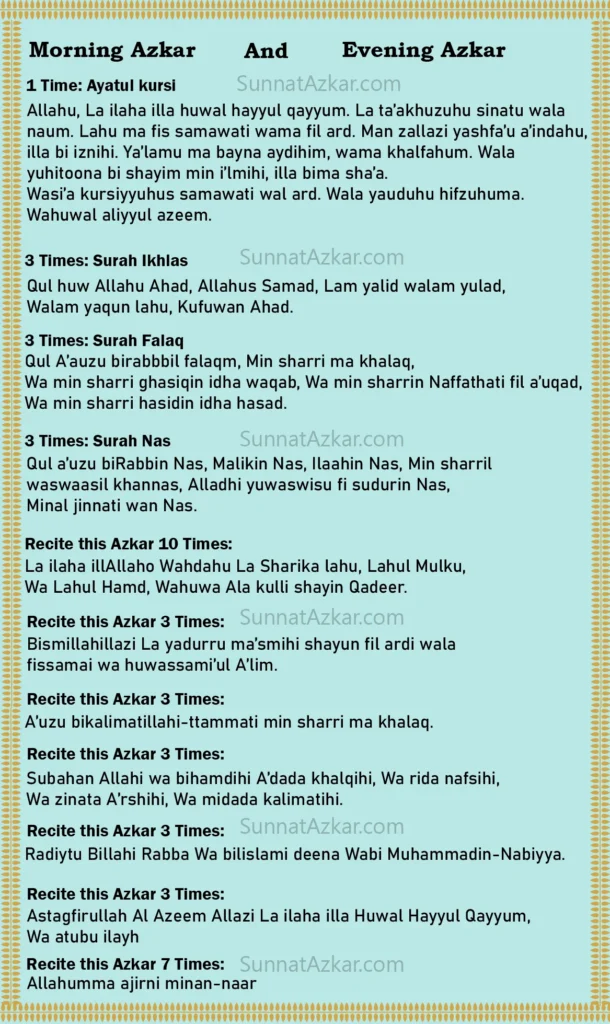
Table of Contents
Agar ap Subah ke Azkar aur Sham ke Azkar hindi me padhna chahte hai to yaha click kar ke padh sakte hai.
Here, it is important to tell you the meaning of a word which is called Hadith Qudsi. Because this word will come repeatedly in front of you when you study Islamic literature.
What is Hadith Qudsi?
Hadith Qudsi is that Hadith in which the Prophet of Allah (ﷺ) himself narrates the words of Allah and these are the words of Allah which are found only in Hadees and not found in the Quran.
We have mentioned one Hadith Qudsi below, so please keep on reading.
When is the right time to do Morning Azkar?
In Islam, morning is called Subah Sadiq which means the true dawn, when the sun is 18 degrees below the horizon, i.e. the time when you refrain from taking food when fasting or when the time of fajr prayer starts.
So if any brother or sister has to say the morning azkar, he/she can do it at the true dawn, there is still time left for fajr azaan. And you can do it after that also, but it is better to do morning azkar early.
When is the right time to do Evening Azkar?
In Islam, the evening time is just before the beginning of Maghrib time. Maghrib time starts when the disk of the Sun is completely disappears behind the horizon. That means you can recite the Evening Azkar 15 to 20 minutes before the Maghrib Azaan. If you are unable to recite at that time then you can recite Evening Azkar even after Maghrib prayer.
Why is it necessary to recite Sunnat Azkar?
Let’s go through some verses of the Quran and some hadees to understand the importance of dhikr, the remembrance of Allah.
أَلَا بِذِكْرِ ٱللَّهِ تَطْمَئِنُّ ٱلْقُلُوبُ
Surely in the remembrance of Allah do hearts find comfort.
Surah Rad, Ayat 28 (Quran 13:28)
Hadees:
Narrated Abu Musa:
The Prophet (ﷺ) said, “The example of the one who celebrates the Praises of his Lord (Allah) in comparison to the one who does not celebrate the Praises of his Lord, is that of a living creature compared to a dead one.”
Reference : Sahih al-Bukhari 6407
Benefits:
From the above mentioned hadees, it becomes clear that the person who remembers Allah is alive in his true mind and the person who does not remember Allah, his heart appears to be dead.
Hadith Qudsi:
It was narrated from Abu Hurairah that the Prophet(ﷺ) said:
“Allah says: ‘I am with My slave when he remembers Me and his lips move saying My Name.'”
Reference : Sunan Ibn Majah 3792
Benefits:
From this hadees, it is known that when a person makes mention of Allah and his lips move then Allah is with him, so such a dhikr in which the person’s lips move is better than the dhikr which the person does in his heart.
وَٱذْكُر رَّبَّكَ كَثِيرًۭا وَسَبِّحْ بِٱلْعَشِىِّ وَٱلْإِبْكَـٰرِ
Remember your Lord often and glorify ˹Him˺ morning and evening.
Surah Ale Imran, Ayat 41 (Quran 3:41)
يَـٰٓأَيُّهَا ٱلَّذِينَ ءَامَنُوا۟ ٱذْكُرُوا۟ ٱللَّهَ ذِكْرًۭا كَثِيرًۭا وَسَبِّحُوهُ بُكْرَةًۭ وَأَصِيلًا
O believers! Always remember Allah often, and glorify Him morning and evening.
Surah Ahzab, Ayat 41 & 42 (Quran 33:41,42)
Hadees:
`Abdullah bin Busr (ra) narrated that:
A man said: “O Messenger of Allah (ﷺ), indeed, the legislated acts of Islam have become too much for me, so inform me of a thing that I should stick to.” He (ﷺ) said: “Let not your tongue cease to be moist with the remembrance of Allah.”
Reference : Jami` at-Tirmidhi 3375
Excellent Sunnat Azkar for reciting at any time
Keeping in view the information given above, one should keep remembering his Lord at every hour. That is why here we have listed 3 such dhikr which you can read anytime in 24 hours.
Subhan-Allahi wa bihamdihi, Subhan-Allahil-Azim
سُبْحَانَ اللَّهِ وَبِحَمْدِهِ سُبْحانَ اللَّهِ الْعَظِيمِ
Hadees:
Abu Hurairah (May Allah be pleased with him) reported:
The Messenger of Allah (ﷺ) said, “There are two statements that are light for the tongue to remember, heavy in the Scales and are dear to the Merciful: ‘Subhan-Allahi wa bihamdihi, Subhan-Allahil-Azim [Glory be to Allah and His is the praise, (and) Allah, the Greatest is free from imperfection]’.”
[Al-Bukhari and Muslim].
Reference : Riyad as-Salihin 1408
Abu Hurairah (May Allah be pleased with him) reported:
The Messenger of Allah (ﷺ) said, “There are two statements that are light for the tongue to remember, heavy in the Scales and are dear to the Merciful: ‘Subhan-Allahi wa bihamdihi, Subhan-Allahil-Azim [Glory be to Allah and His is the praise, (and) Allah, the Greatest is free from imperfection]’.”
[Al-Bukhari and Muslim].
Reference : Riyad as-Salihin 1408
Subahan Allah, Wa Alhamdo Lillah, Wa La Ilaha illAllahu Wa Allahu Akbar
سُبْحَانَ اللَّهِ وَالْحَمْدُ لِلَّهِ وَلَا إِلَهَ إِلَّا اللَّهُ وَاللَّهُ أَكْبَرُ
Hadees:
Samura b. Jundub reported God’s messenger as saying, “The most excellent words are four: Subahan Allah, Wa Alhamdo Lillah, Wa La Ilaha illAllahu Wa Allahu Akbar (Glory be to God; Praise be to God; there is no god but God; and God is most great).”
A version has, “The words dearest to God are four: Subahan Allah, Wa Alhamdo Lillah, Wa La Ilaha illAllahu Wa Allahu Akbar (Glory be to God; Praise be to God; there is no god but God; and God is most great).
It does not matter which you say first.”
Muslim transmitted it.
Allah’s Messenger (ﷺ) said:
For me to say: Subḥānallāh, walḥamdu lillāh, wa lā ilāha illallāh, wallāhu ‘Akbar (Glory is to Allah, and praise is to Allah, and there is none worthy of worship but Allah, and Allah is the Most Great) is dearer to me than all that the sun rises upon (i.e. the whole world).
Reference:
Muslim 4/2072. Hisn al-Muslim 257
La ilaha illal-lah wahdahu la sharika lahu, lahu-l-mulk wa lahul- hamd wa huwa ‘ala kulli shai’in qadir
لا إلهَ إلاّ اللّهُ وحْـدَهُ لا شَـريكَ لهُ، لهُ المُـلْكُ ولهُ الحَمْـد، وهُوَ على كُلّ شَيءٍ قَدير
Hadis:
Narrated Abu Huraira:
Allah’s Messenger (ﷺ) said,” Whoever says: “La ilaha illal-lah wahdahu la sharika lahu, lahu-l-mulk wa lahul- hamd wa huwa ‘ala kulli shai’in qadir,” one hundred times will get the same reward as given for manumitting ten slaves; and one hundred good deeds will be written in his accounts, and one hundred sins will be deducted from his accounts, and it (his saying) will be a shield for him from Satan on that day till night, and nobody will be able to do a better deed except the one who does more than he.
Abu Hurairah (May Allah be pleased with him) reported:
The Messenger of Allah (ﷺ) said, “He who recites after every prayer: Subhan-Allah (Allah is free from imperfection) thirty-three times; Al-hamdu lillah (praise be to Allah) thirty-three times; Allahu Akbar (Allah is Greatest) thirty-three times; and completes the hundred with: La ilaha illallahu, wahdahu la sharika lahu, lahul-mulku wa lahul-hamdu, wa Huwa ‘ala kulli shai’in Qadir (there is no true god except Allah. He is One and He has no partner with Him. His is the sovereignty and His is the praise, and He is Omnipotent), will have all his sins pardoned even if they may be as large as the foam on the surface of the sea.”
[MUSLIM]
Morning Azkar and Evening Azkar
Morning Azkar and Evening Azkar are the same, only some of the morning and evening supplications are there in which there is a difference of one or two words which we will talk about later in this post.
Below we have mentioned 11 Azkar, one by one, with English transliterations, and Arabic text. The number of times one has to recite each Azkar in the morning and in the evening is also mentioned respectively.
Ayatul Kursi (Quran Surah 2: Ayat 255): 1 Time
ٱللَّهُ لَآ إِلَـٰهَ إِلَّا هُوَ ٱلْحَىُّ ٱلْقَيُّومُ ۚ لَا تَأْخُذُهُۥ سِنَةٌۭ وَلَا نَوْمٌۭ ۚ لَّهُۥ مَا فِى ٱلسَّمَـٰوَٰتِ وَمَا فِى ٱلْأَرْضِ ۗ مَن ذَا ٱلَّذِى يَشْفَعُ عِندَهُۥٓ إِلَّا بِإِذْنِهِۦ ۚ يَعْلَمُ مَا بَيْنَ أَيْدِيهِمْ وَمَا خَلْفَهُمْ ۖ وَلَا يُحِيطُونَ بِشَىْءٍۢ مِّنْ عِلْمِهِۦٓ إِلَّا بِمَا شَآءَ ۚ وَسِعَ كُرْسِيُّهُ ٱلسَّمَـٰوَٰتِ وَٱلْأَرْضَ ۖ وَلَا يَـُٔودُهُۥ حِفْظُهُمَا ۚ وَهُوَ ٱلْعَلِىُّ ٱلْعَظِيمُ
Allahu, La ilaha illa huwal hayyul qayyum. La ta’akhuzuhu sinatu wala naum. Lahu ma fis samawati wama fil ard. Man zallazi yashfa’u a’indahu, illa bi iznihi. Ya’lamu ma bayna aydihim, wama khalfahum. Wala yuhitoona bi shayim min i’lmihi, illa bima sha’a. Wasi’a kursiyyuhus samawati wal ard. Wala yauduhu hifzuhuma. Wahuwal aliyyul azeem.
Surah Ikhlas (Quran Surah 112): 3 Times
. قُلۡ هُوَ ٱللَّهُ أَحَدٌ ، ٱللَّهُ ٱلصَّمَدُ ، لَمۡ يَلِدۡ وَلَمۡ يُولَدۡ ، وَلَمۡ يَكُن لَّهُ ڪُفُوًا أَحَدٌ
Qul huw Allahu Ahad, Allahus Samad, Lam yalid walam yulad, Walam yaqun lahu Kufuwan Ahad.
Surah Falaq (Quran Surah 113): 3 Times
قُلۡ أَعُوذُ بِرَبِّ ٱلۡفَلَقِ ، مِن شَرِّ مَا خَلَقَ ، وَمِن شَرِّ غَاسِقٍ إِذَا وَقَبَ ، وَمِن شَرِّ ٱلنَّفَّـٰثَـٰتِ فِى ٱلۡعُقَدِ ، وَمِن شَرِّ حَاسِدٍ إِذَا حَسَدَ
Qul A’auzu birabbbil falaq, Min sharri ma khalaq, Wa min sharri ghasiqin idha waqab, Wa min sharrin Naffathati fil a’uqad, Wa min sharri hasidin idha hasad.
Surah Nas (Quran Surah 114): 3 Times
قُلۡ أَعُوذُ بِرَبِّ ٱلنَّاسِ ، مَلِكِ النَّاسِ ، إِلَـٰهِ ٱلنَّاسِ ، مِن شَرِّ ٱلۡوَسۡوَاسِ ٱلۡخَنَّاسِ ، ٱلَّذِى يُوَسۡوِسُ فِى صُدُورِ ٱلنَّاسِ ، مِنَ ٱلۡجِنَّةِ وَٱلنَّاسِ
Qul a’uzu biRabbin Nas, Malikin Nas, Ilaahin Nas, Min sharril waswaasil khannas, Alladhi yuwaswisu fi sudurin Nas, Minal jinnati wan Nas.
Recite this Azkar 10 Times:
لا إلهَ إلاّ اللّهُ وحْـدَهُ لا شَـريكَ لهُ، لهُ المُـلْكُ ولهُ الحَمْـد، وهُوَ على كُلّ شَيءٍ قَدير
La ilaha illAllaho Wahdahu La Sharika lahu, Lahul Mulku, Wa Lahul Hamd, Wahuwa Ala kulli shayin Qadeer.
Reference: Sahih Al Bukhari 6403
Recite this Azkar 3 Times:
بِسْمِ اللَّهِ الَّذِي لَا يَضُرُّ مَعَ اسْمِهِ شَيْءٌ فِي الْأَرْضِ وَلَا فِي السَّمَاءِ وَهُوَ السَّمِيعُ الْعَلِيمُ.
Bismillahillazi La yadurru ma’smihi shayun fil ardi wala fissamai wa huwassami’ul A’lim.
Reference: Musnad Ahmad 446
Recite this Azkar 3 Times:
أَعـوذُ بِكَلِـماتِ اللّهِ التّـامّاتِ مِنْ شَـرِّ ما خَلَـق
A’uzu bikalimatillahi-ttammati min sharri ma khalaq.
Reference: Sahih Muslim 4/2080 .
Recite this Azkar 3 Times:
سُبْحـانَ اللهِ وَبِحَمْـدِهِ عَدَدَ خَلْـقِه ، وَرِضـا نَفْسِـه ، وَزِنَـةَ عَـرْشِـه ، وَمِـدادَ كَلِمـاتِـه
Subahan Allahi wa bihamdihi A’dada khalqihi, Wa rida nafsihi, Wa zinata A’rshihi, Wa midada kalimatihi.
Reference: Sahih Muslim 4/2090 , Sahih Muslim 6913.
Recite this Azkar 3 Times:
رَضيـتُ بِاللهِ رَبَّـاً وَبِالإسْلامِ ديـناً وَبِمُحَـمَّدٍ نَبِيّـاً
Radiytu Billahi Rabba Wa bilislami deena Wabi Muhammadin-Nabiyya.
Reference: Hisn Al Muslim 87
Recite this Azkar 3 Times:
أَسْتَغْفِرُ اللَّهَ الْعَظيمَ الَّذِي لاَ إِلَهَ إِلاَّ هُوَ الْحَيُّ القَيّوُمُ وَأَتُوبُ إِلَيهِ
Astagfirullah Al Azeem Allazi La ilaha illa Huwal Hayyul Qayyum Wa atubu ilayh
Reference: Hisn Al Muslim 250
Recite this Azkar 7 Times After Fajr and Maghrib Prayers:
اللَّهُمَّ أَجِرْنِي مِنَ النَّارِ
Allahumma ajirni minan-naar
Reference: Mishkat al-Masabih 2396
Morning Supplications
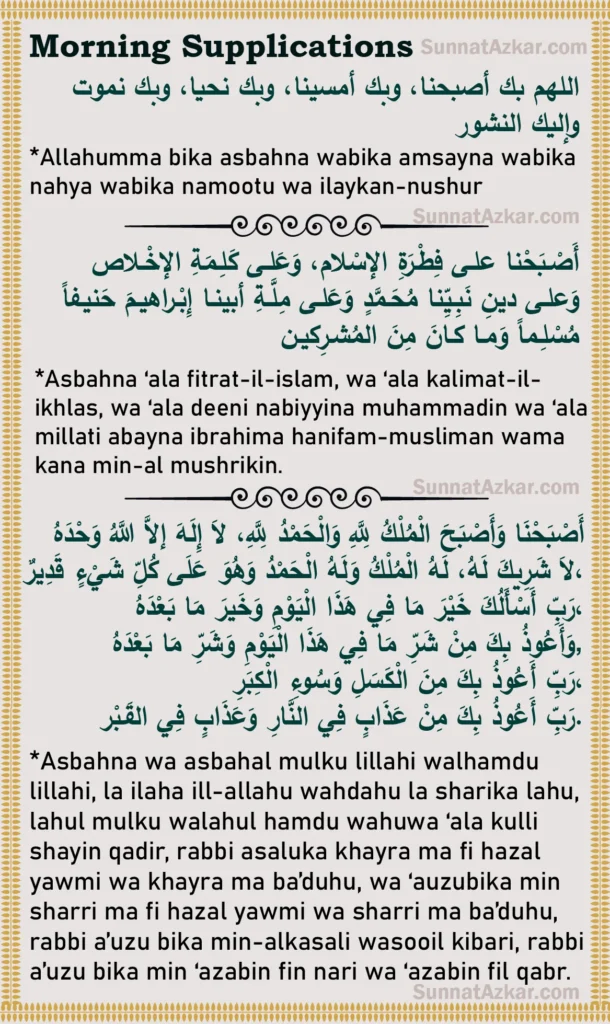
Apart from Morning Azkar, There are 3 Supplications which you should recite in the morning.
اللهم بك أصبحنا، وبك أمسينا، وبك نحيا، وبك نموت، وإليك النشور
Allahumma bika asbahna wabika amsayna wabika nahya wabika namootu wa ilaykan-nushur
أَصْـبَحْنا علـى فِطْـرَةِ الإسْلام، وَعَلـى كَلِـمَةِ الإخْـلاص، وَعلـى دينِ نَبِـيِّنا مُحَـمَّدٍ وَعَلـى مِلَّـةِ أبينـا إِبْـراهيـمَ حَنيـفاً مُسْلِـماً وَمـا كـانَ مِنَ المُشـرِكيـن
Asbahna ‘ala fitrat-il-islam, wa ‘ala kalimat-il-ikhlas, wa ‘ala deeni nabiyyina muhammadin wa ‘ala millati abayna ibrahima hanifam-musliman wama kana min-al mushrikin.
أَصْبَحْنَا وَأَصْبَحَ الْمُلْكُ لِلَّهِ وَالْحَمْدُ لِلَّهِ، لاَ إِلَهَ إلاَّ اللَّهُ وَحْدَهُ لاَ شَرِيكَ لَهُ، لَهُ الْمُلْكُ وَلَهُ الْحَمْدُ وَهُوَ عَلَى كُلِّ شَيْءٍ قَدِيرٌ، رَبِّ أَسْأَلُكَ خَيْرَ مَا فِي هَذَا الْيَوْمِ وَخَيرَ مَا بَعْدَهُ، وَأَعُوذُ بِكَ مِنْ شَرِّ مَا فِي هَذَا الْيَوْمِ وَشَرِّ مَا بَعْدَهُ, رَبِّ أَعُوذُ بِكَ مِنَ الْكَسَلِ وَسُوءِ الْكِبَرِ، رَبِّ أَعُوذُ بِكَ مِنْ عَذَابٍ فِي النَّارِ وَعَذَابٍ فِي القَـبْر
Asbahna wa asbahal mulku lillahi walhamdu lillahi, la ilaha ill-allahu wahdahu la sharika lahu, lahul mulku walahul hamdu wahuwa ‘ala kulli shayin qadir, rabbi asaluka khayra ma fi hazal yawmi wa khayra ma ba’duhu, wa a‘uzubika min sharri ma fi hazal yawmi wa sharri ma ba’duhu, rabbi a’uzu bika min-alkasali wasooil kibari, rabbi a’uzu bika min ‘azabin fin nari wa ‘azabin fil qabr.
Evening Supplications
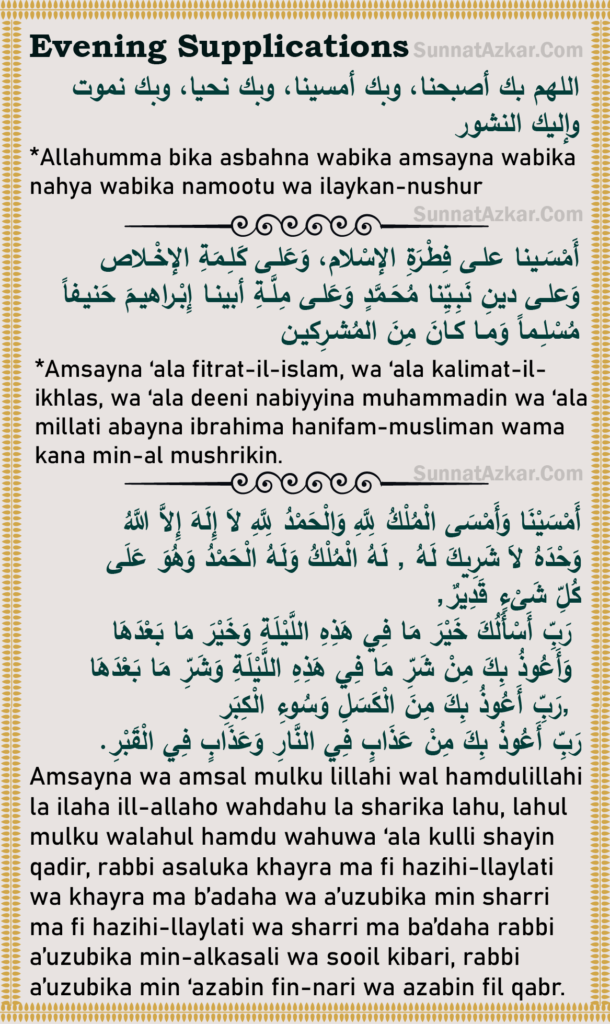
Apart from Evening Azkar, There are 3 Supplications which you should recite in the Evening.
اللهم بك أصبحنا، وبك أمسينا، وبك نحيا، وبك نموت، وإليك النشور
Allahumma bika asbahna wabika amsayna wabika nahya wabika namootu wa ilaykan-nushur
أَمْسَـينا علـى فِطْـرَةِ الإسْلام، وَعَلـى كَلِـمَةِ الإخْـلاص، وَعلـى دينِ نَبِـيِّنا مُحَـمَّدٍ وَعَلـى مِلَّـةِ أبينـا إِبْـراهيـمَ حَنيـفاً مُسْلِـماً وَمـا كـانَ مِنَ المُشـرِكيـن
Amsayna ‘ala fitrat-il-islam, wa ‘ala kalimat-il-ikhlas, wa ‘ala deeni nabiyyina muhammadin wa ‘ala millati abayna ibrahima hanifam-musliman wama kana min-al mushrikin.
أَمْسَيْنَا وَأَمْسَى الْمُلْكُ لِلَّهِ وَالْحَمْدُ لِلَّهِ لاَ إِلَهَ إِلاَّ اللَّهُ وَحْدَهُ لاَ شَرِيكَ لَهُ , لَهُ الْمُلْكُ وَلَهُ الْحَمْدُ وَهُوَ عَلَى كُلِّ شَىْءٍ قَدِيرٌ, رَبِّ أَسْأَلُكَ خَيْرَ مَا فِي هَذِهِ اللَّيْلَةِ وَخَيْرَ مَا بَعْدَهَا وَأَعُوذُ بِكَ مِنْ شَرِّ مَا فِي هَذِهِ اللَّيْلَةِ وَشَرِّ مَا بَعْدَهَا رَبِّ أَعُوذُ بِكَ مِنَ الْكَسَلِ وَسُوءِ الْكِبَرِ, رَبِّ أَعُوذُ بِكَ مِنْ عَذَابٍ فِي النَّارِ وَعَذَابٍ فِي الْقَبْرِ.
Amsayna wa amsal mulku lillahi wal hamdulillahi la ilaha ill-allaho wahdahu la sharika lahu, lahul mulku walahul hamdu wahuwa ‘ala kulli shayin qadir, rabbi asaluka khayra ma fi hazihi-llaylati wa khayra ma b’adaha wa a’uzubika min sharri ma fi hazihi-llaylati wa sharri ma ba’daha rabbi a’uzubika min-alkasali wa sooil kibari, rabbi a’uzubika min ‘azabin fin-nari wa azabin fil qabr.
Share it with blessings: Share SunnatAzkar.com with your friends and relatives:
We want the blessings of Dua, Azkar, and Hadees should reach every person in a precise manner. Our only intention at SunnatAzkar.com is to provide you with the guidance and knowledge you are looking for with caution, and steer clear of mistakes.
Now you can contribute to this great ambition of ours. Share this post with your friends, family, and loved ones. By doing this you will not only help in creating a strong Islamic world but will also help in achieving the indestructible faith in Allah.
Today the sea of information is raging with true and false information mixed with one another in this world of the internet. We want to become the source of error-free Islamic knowledge and to reach those who are searching for this true information.
Tell everyone about SunnatAzkar.com, and that on SunnatAzkar.com there is Truthfulness, there is Islam.
May Allah spread the knowledge and blessings of Islam to every corner of the world through your spread, and may Allah Rabbul Izzat grant you innumerable rewards.
If you want to prevent yourself and your family from black magic, then read our post about 4 Qul by clicking here. We have given English transliteration and translation of 4 Qul in this post.

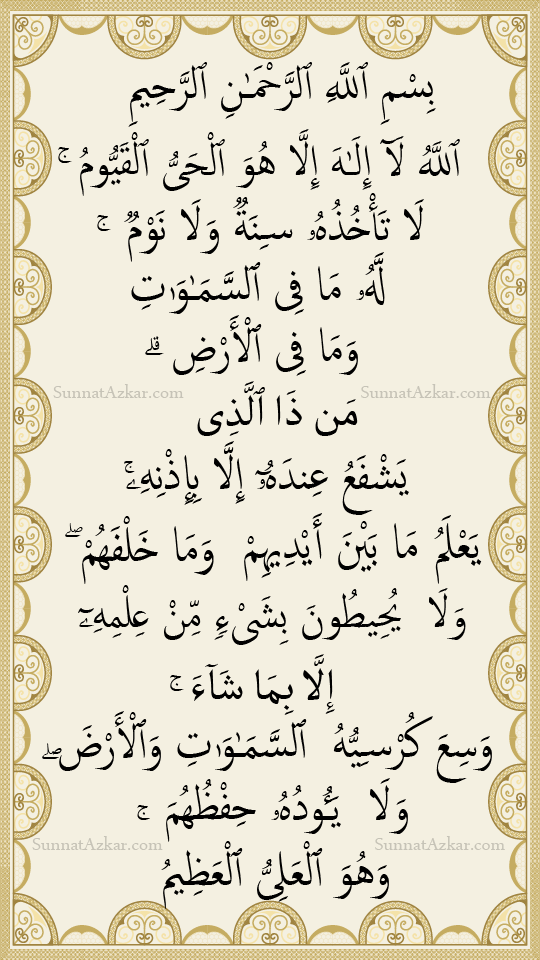
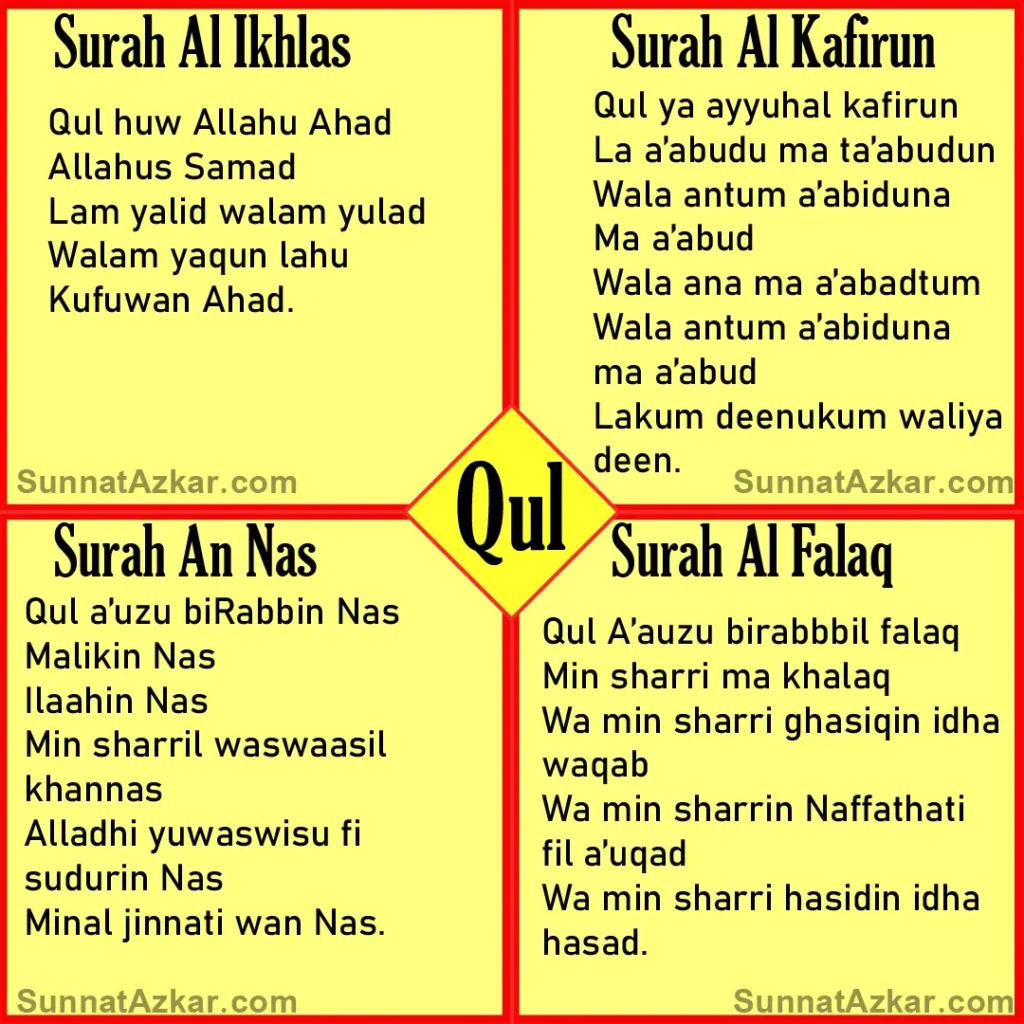
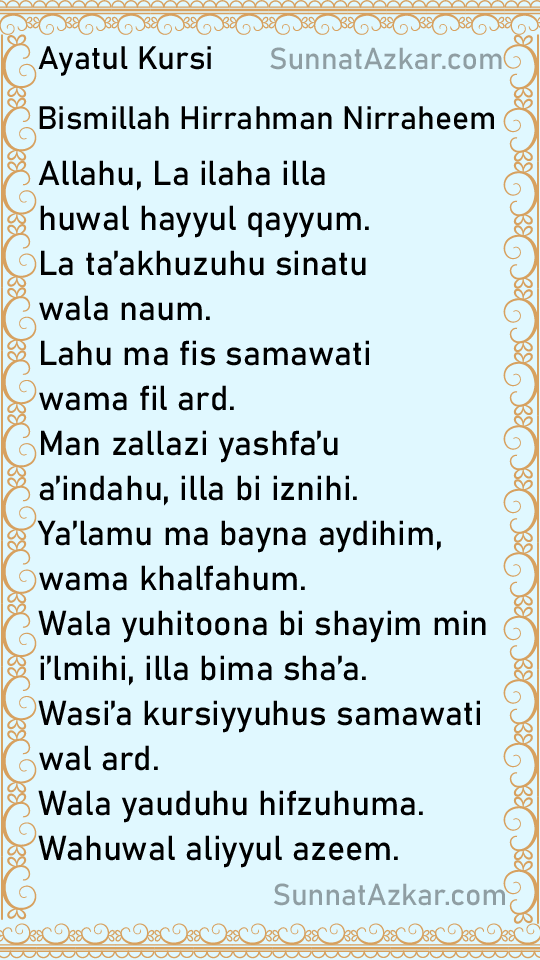
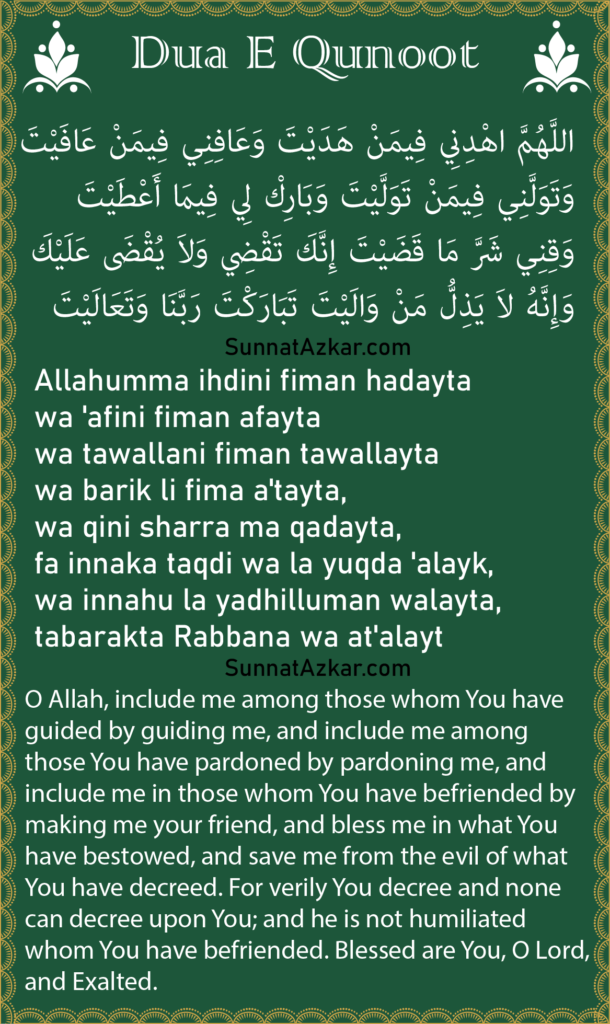
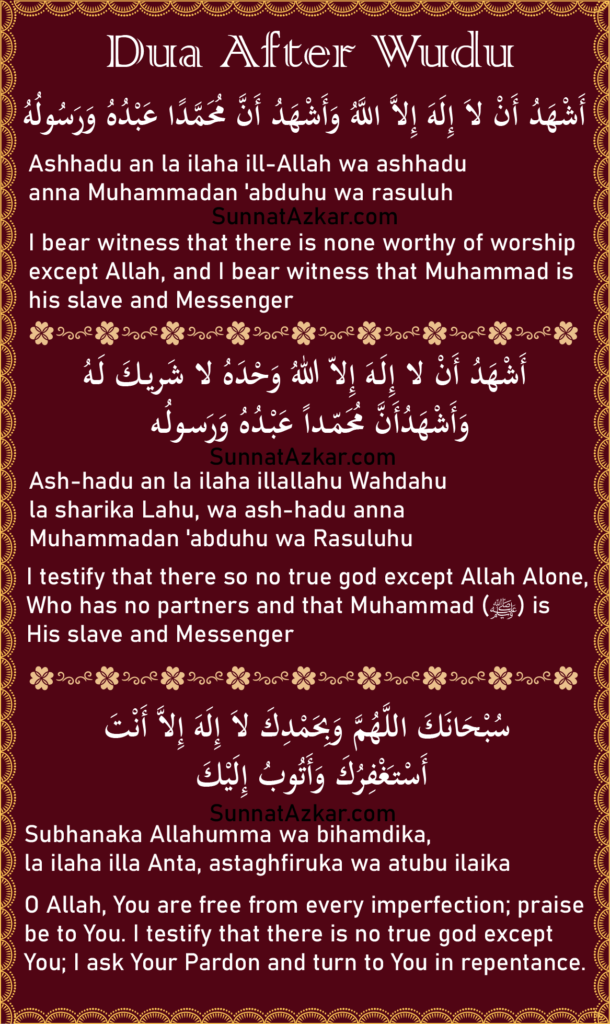
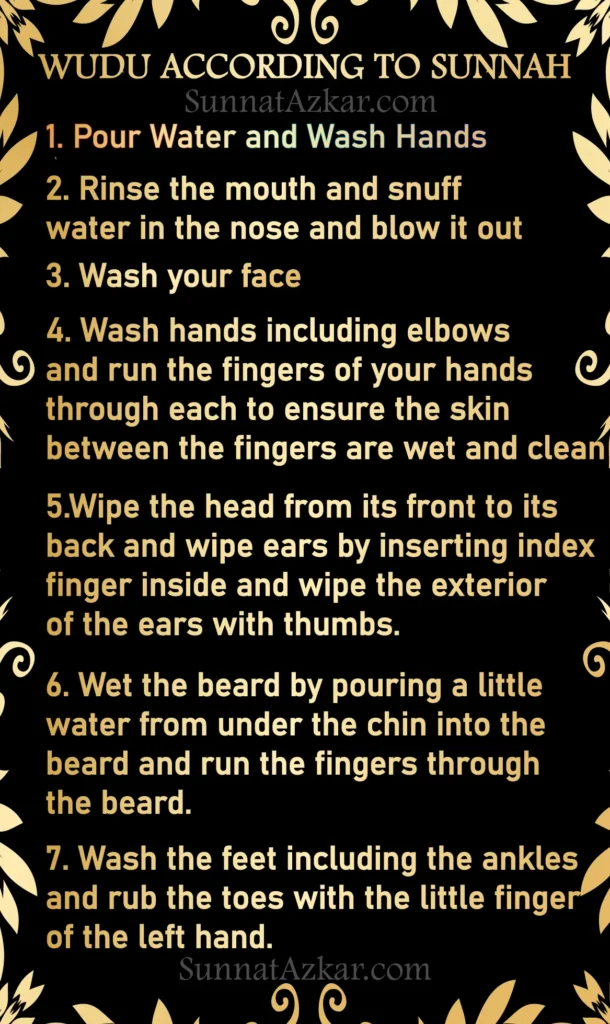

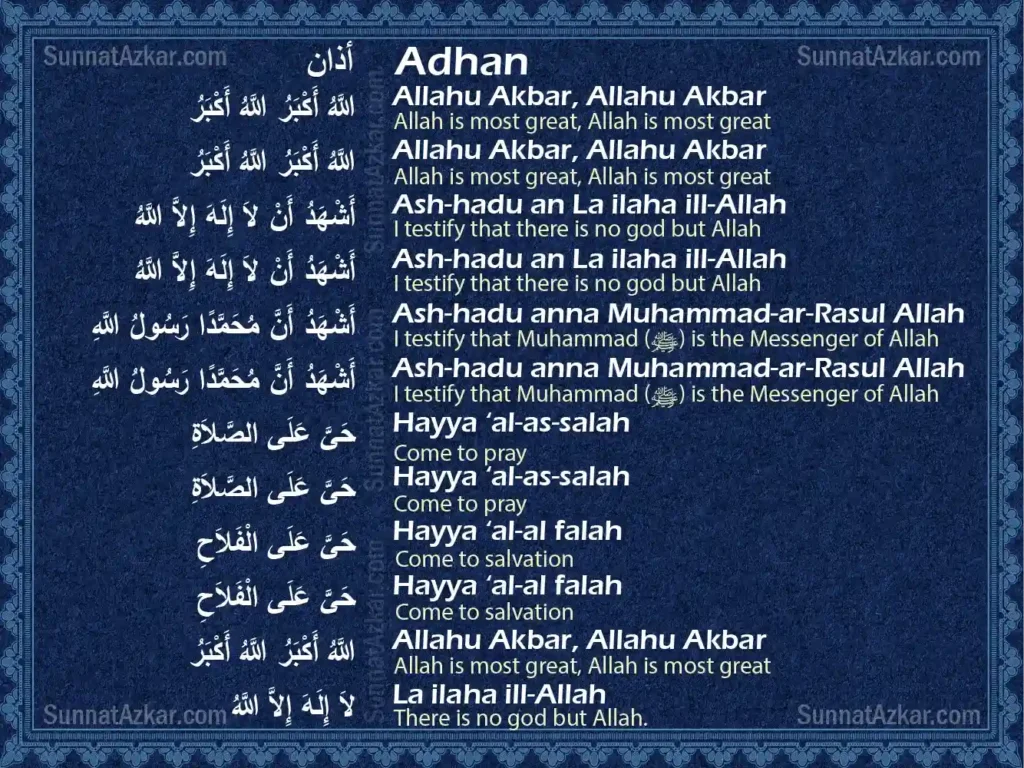
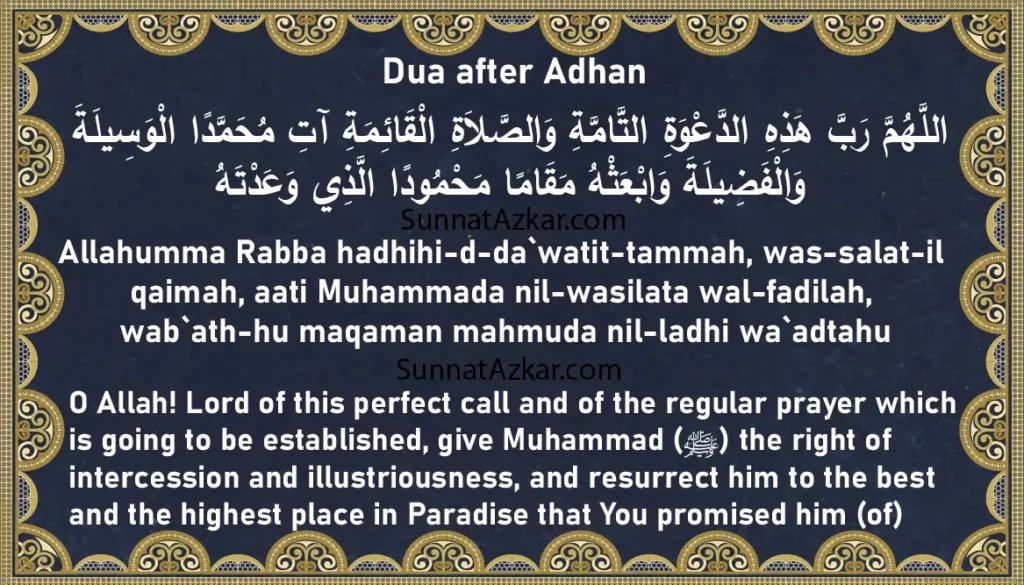
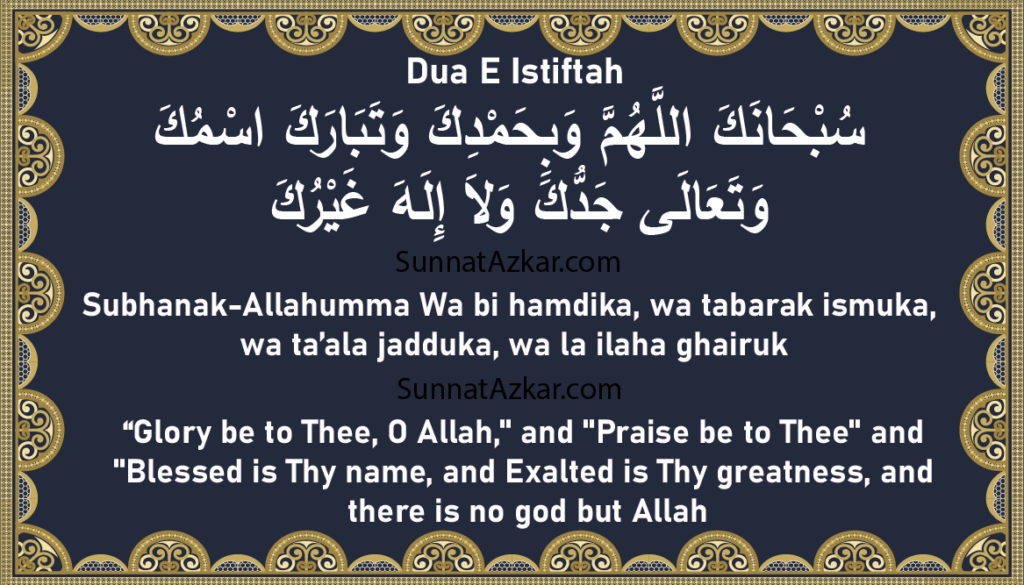

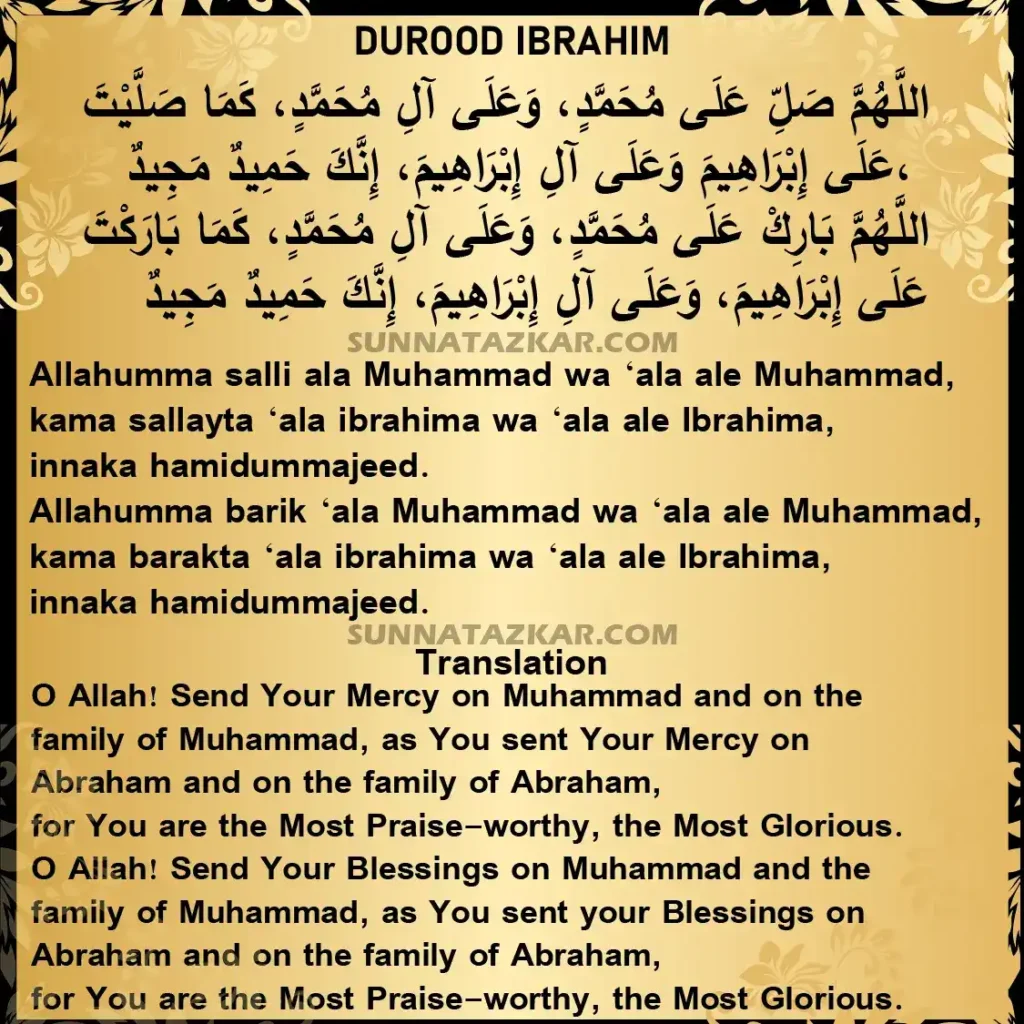
Pingback: The Easiest Wazifa with Great Reward - SunnatAzkar